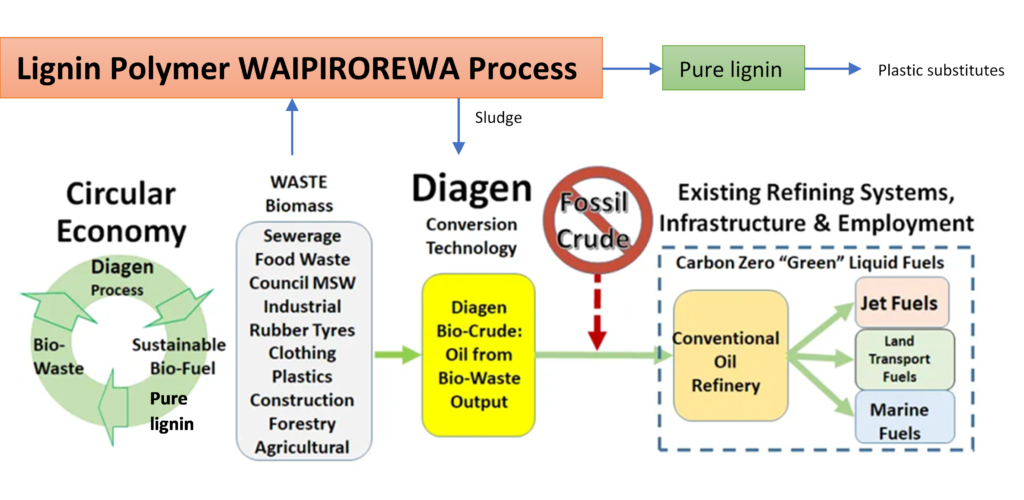The Tairawhiti Lignin and Bio-oil Production Facility proposed to be located in Gisborne will process biomass and other organic wastes to produce pure lignin and bio-oil using the Solray DIAGEN and Lignin Polymer WAIPIROREWA processes.
Lignin exists naturally in plants and trees and its complex chemical structure allows for use in a wide range of applications. Lignin is a raw material that can be used to produce value added products, – a raw material that is potentially available in large amounts and that could provide replacement for many “plastics” currently produced from petroleum.

First using the Solray Lignin Polymer WAIPIROREWA process for extraction of the pure lignin[1]and maybe residual Copper, Chrome and Arsenic if processing tantalised timber, then the remaining cellulose pulp is mixed with municipal sewage sludge and liquid trade waste from food processing.
The Solray DIAGEN Process then converts this biomass and other organic matter to a West Texas Intermediate (WTI) type crude bio-oil which can be refined into transport biofuels. The process uses HydroThermal Liquefaction (HTL) technology to breakdown the waste at a molecular level and reform it within the reactor.
The DIAGEN process operates most efficiently processing biomass when the small particle fibrous cellulosic biomass is mixed with high moisture greasy microcellular organic matter. These are organic sludges such as sewage or algae microcellular material, and fibrous material, plastics and other organic material.
The bio-oil is suitable for refining into transport fuels at the Marsden refinery and the lignin can be available as a feedstock for export or establishment of new industry producing bio-based materials.
The Solray Diagen Reactor process is a modular constructed continuous process with a biomass to biofuel conversion efficiency of about 35%, meeting European Directive RED II (2016) fuel specification.
For further information:
Technical: Chris Bathurst, chris@solraysystems.co.nz ,+64 (0) 27 205 2069
Commercial: Brian Cox, brian.cox@eastharbour.co.nz ,+64 (0) 27 477 1048
[1]Pure lignin is different from the lignin produced by the pulp and paper mills which has been damaged because the Kraft process uses strong caustic or acidic chemicals to fully remove the lignin and to leave only the cellulose. Pulp lignin cannot be softened and extruded and formed into plastic products as easily as pure lignin.